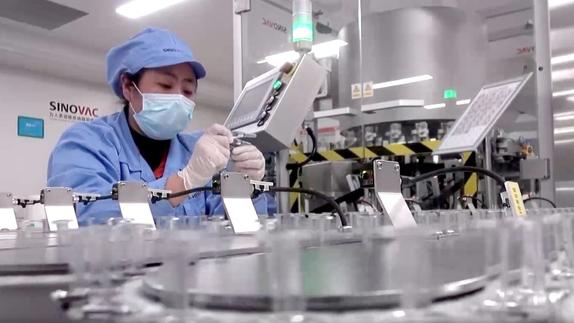 This undated photo shows a worker in the production line of Sinovac's COVID-19 vaccine. (PHOTO / XINHUA)
This undated photo shows a worker in the production line of Sinovac's COVID-19 vaccine. (PHOTO / XINHUA)
BEIJING - About 500 million doses of the CoronaVac vaccine solutions developed by the Beijing-based Sinovac Life Sciences Co. Ltd. can be produced annually in the southern suburbs of the capital city.
"The production line for the second phase of our vaccine solutions will be put into operation in February this year, with a projected annual production capacity of more than 1 billion doses," said Yin Weidong, CEO of Sinovac Biotech Ltd, which has a majority stake in the vaccine producer.
On Dec 15, 2020, China officially launched the COVID-19 vaccination program for the winter-spring period targeting a number of key groups, including those engaged in handling imported cold-chain products, customs officers, medical workers, and people working in the public transport sector and fresh markets
On Dec 15, 2020, China officially launched the COVID-19 vaccination program for the winter-spring period targeting a number of key groups, including those engaged in handling imported cold-chain products, customs officers, medical workers, and people working in the public transport sector and fresh markets.
Currently, over 10 million doses have been administered in China, according to the country's health authorities.
ALSO READ: Brazil: China vaccine 'capable of preventing disease, death'
Since the company's vaccine workshops came on stream in August 2020, the staff along with the machines have been working round the clock to ensure domestic jab supply and help uphold China's commitment to making its self-developed vaccines a global public good, said Yin.
From cell culture to packaging, a jab can be produced in just 48 days. Now the company churns out about 400,000 doses a day for domestic needs.
In the company's workshops, automation equipment is visible everywhere, and it's all for the safety of workers as it helps minimize direct human contact with the vaccine ingredients.
Inactivated COVID-19 virus is first purified and tested before it goes through proportioning into a semi-finished product. In the filling workshop, staff equipped with specialized rubber gloves inspect the jabs and check for foreign matter in the pharmaceutical containers off the production line. Stringent sampling inspection is also conducted in the laboratories to ensure the jabs are fit for use.
ALSO READ: China to expand COVID-19 vaccine manufacturing capacity
"Our vaccine has very good stability as it met the national quality criteria after being kept at 25 degrees Celsius for 42 days or 37 degrees Celsius for 21 days," Yin said, adding that it is speculated that the jabs can be stored at two to eight degrees Celsius for a very long time and the current expiry date is three years.
The Sinovac Life Sciences company uses cold-chain vehicles to transport the vaccines to far-flung centers for disease control and prevention in China. The vaccines are transported by air to parts of the globe in temperature control boxes. Thermometric indicators monitor and record the dynamics during the entire process to ensure the safety and effectiveness of the vaccines.
"Recipients can use a designated software to read the recorded data to verify that the vaccine has indeed been kept between two and eight degrees Celsius," Yin said.
Of late, the vaccine producer shipped semi-finished jabs, equivalent to 15 million doses to Indonesia. China's vaccine enterprises have been called to plan and increase production capacity and contribute to vaccine accessibility and affordability in developing countries.
READ MORE: Chinese vaccines show effective protection against COVID-19
"Currently, our vaccines have been exported to countries including Brazil, Turkey and Indonesia. A part is exported as semi-finished jabs and will be completed with the help of filling and packing lines set up overseas, so as to boost global supply capacity," he added.
China has announced that after its self-developed vaccines are approved and available to the public, they will be offered free to Chinese people, who can receive inoculation on a voluntary, informed basis.
The cost of COVID-19 vaccination, including the expense of both vaccines and inoculation fees, will be covered by medical insurance and government funds, rather than individuals.


